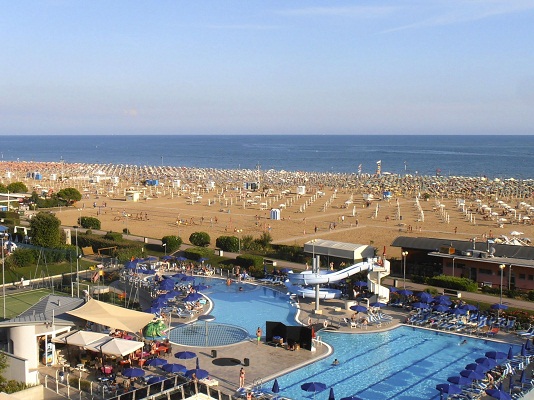Bibione resort first Italian beach to go completely smoke-free

OLYMPUS DIGITAL CAMERA
Venice: The Venetian seaside resort of Bibione will be the first Italian beach to go completely smoke-free, in a mission to safeguard the environment from discarded cigarette ends and protect visitors from secondhand smoke.
The decision comes after eight years of trials, as part of the Breathe the Sea Air project, which saw an initial smoking ban between the first row of umbrellas to the water’s edge. New measures, to be imposed by the end of May, will include designated smoking areas 300 to 400 metres away from the sea, at the edge of the beach. Details regarding fines and whether e-cigarettes are to be permitted will be published in May.
Cigarettes filters, which contain slow-degrading plastic cellulose acetate, can take up to 10 years to decompose. Approximately 5.5 trillion cigarettes are sold worldwide each year, with a vast number of the ends discarded into the surrounding environment. As part of the trials between 2014 and 2018, 550,000 cigarette ends were collected on Bibione beach, which would have otherwise ended up in the sand or sea.
The 8km stretch of beach received 5,317,064 visitors in 2017, making it the fourth most visited beach in the country, after Rimini, Cavallino-Treporti and Jesolo. Of those surveyed, the majority of visitors were in favour of the ban, with 50% supporting a total ban and a further 26% approving of it as long as designated smoking areas were provided. The project has also been backed by the World Health Organisation and health authorities across Italy.
“We’re interested in giving the people who choose to spend their holidays here the chance to breathe the clean sea air without having to put up with polluting substances that are harmful to health,” said Pasqualino Codognotto, mayor of San Michele al Tagliamento-Bibione. “It is also a way of working alongside our guests to promote a culture based on respect, and we are confident that non-smokers and smokers will seize the opportunity that it presents. The initiative also has the backing of all of the members of the local tourist industry.”
Scientific research used to support the move included a report from the Stop Smoking Centre at the Italian National Tumour Institute in Milan, which measured air pollution on and around Bibione beach. It found peaks in pollution levels from cigarettes even from a distance of 10 metres from smokers, and that even though peaks only lasted a few seconds, levels were higher than at the busy roundabout at the resort entrance. The average black carbon measurement (tiny, toxic pollution particles) from when a cigarette was lit until it was put out was 7.4 micrograms/m³, compared with 2.1 at the roundabout and 1.8 on the beach overall.
“This project by Bibione shows that there are no excuses when it comes to health,” said Dr Roberto Boffi, head of respiratory medicine at the institute, who led the report. “For instance, take the Sirchia law that banned smoking in public places. People were initially worried about its impact [on the economy and tourism] but it subsequently set the benchmark on a global scale. My team and I have worked with the resort to show that passive smoking on beaches can be extremely harmful. It is breaking important new ground with this scheme and I hope other beaches will follow its example soon.”
Other places that have already introduced a ban include Queensland, Australia, on all its patrolled beaches; more than 300 beaches across the US and as of 2018 24 beaches in Thailand, including Patong beach in Phuket and Bo Phut on Koh Samui. Two Welsh beaches have introduced voluntary bans – Little Haven in Pembrokeshire and Caswell Bay in Swansea.
Italy imposed a smoking ban in public enclosed places in 2005, prohibiting smoking in bars, restaurants, clubs and offices. The European commission has called several times for a ban on smoking in public areas, including urging member counties in 2017 to put policies in place to make public spaces, including beaches, smoke-free.





